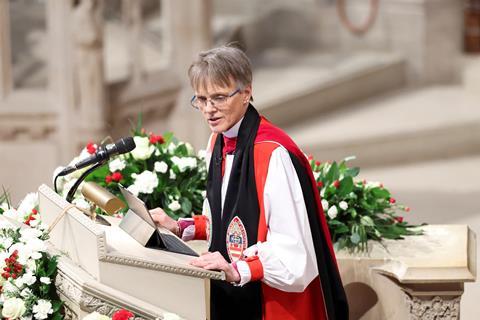Bishop Mariann Budde’s decision to use her sermon to challenge US President Donald Trump has caused widespread debate. Should Christians be speaking truth to power? Yes, says Andy Flannagan, but only if we’re willing to do the hard yards of seeking understanding, and listening to those we disagree with

In the past 24 hours my social media feed has been full of Christians either cheering on Mariann Edgar Budde or slating her.
This is because Bishop Mariann used her sermon to address Trump directly, and asked him to show mercy on people who were “scared” of what is to come.
Her comments led to an immediate online backlash and debate over whether or not it is appropriate for ‘the church’ or ‘politics’ to intervene in each other’s ‘territory’.
I have been in the midst of plenty of these bunfights in the UK, usually after a bishop or an archbishop has challenged something about government policy. Those on one side cheer, while those on the other side shake their heads and say, “that’s not their job – that’s not appropriate for them to comment.”
This is a pointless public square scrum and it happens when we forget that the Church is not an institution, but a community made up of people who follow Jesus.
So when people ask me whether or not the church should be commenting on national issues, I’ll ask them, “Should you be commenting on national issues?”. “Absolutely!” is usually the reply. “Well, you’re part of the Church, so would it not seem wrong to stop you saying what you think?”
Christ’s example
Jesus was constantly speaking truth to power. The religious leaders of his day were also the political leaders, so when he challenged them he was challenging the status quo.
When folks say to me, “yes Jesus was political but he wasn’t a politician”, I usually point out that he also wasn’t an airline pilot or an accountant, and are they suggesting that carpentry is the only valid career option for a Christian? I have been at festivals where people have raised their hands after my talks and said, “Andy – that’s great, bless you for what you’re involved in, but I think I speak for many in the crowd here, because we know power corrupts and absolute power corrupts absolutely, so it’s safer for us to lead in the context of the church, not in politics.” As if the abuse of power in the church has never been a problem! Here is the sacred-secular divide writ large and restricting God’s values to one little section of society rather than being for all of society for all time.
This is without mentioning that discussing whether or not the Church should speak into politics ignores the fact that thousands upon thousands of members of the Church are simultaneously doing politics every day of their lives as MPs, Lords, councillors, researchers and party members! The sacred-secular divide fools us that these are separate worlds.
Disagreeing well
So should we speak truth to the new power? I would have thought the answer is obvious.
Now that the election is over, America will actually be best served by constructive encouragement and prophetic challenge from its Christian population (of course the same challenge applies here, where left leaning folks in the UK must be open to hearing criticism). I sense we’re in an interesting season where lots of American Christians will actually be able to prove that they aren’t lost in an idolatrous cult simply by occasionally pointing out one or two things they disagree with in Trump’s policy and character, as well what they may be celebrating.
But before you sharpen your pencil, or more likely, start bashing away at that keyboard, we need to remind ourselves to do the hard yards of developing an argument. Try it out in person with those whom we disagree. Properly research your subject (that doesn’t mean just doing a bit of Googling). If you can’t become an expert yourself, then at least consult with those who have done that hard work.
This is the polar opposite of sharing a meaningless jpeg that has been created by someone with an agenda and without a fact-checker just because it agrees with what our gut tells us. As Christians we are suckers for a conspiracy theory because we believe the most amazing story of supernatural, invisible forces at play. But that’s a well-evidenced story, through the historical record and the witness of generations of believers.
So yes, let’s speak truth into the public square, but let’s have a responsibly high bar for what we believe to be true before we speak it into the public square. Those who teach should be careful. And in our churches mostly we are. Let’s allow that to spread out into our actions in the wider world. Let’s heed the words of James 3:1 “Not many of you should become teachers, my fellow believers, because you know that we who teach will be judged more strictly.”
Which for me does not equate to “Hey everyone just say whatever you like whenever you like, as that will have no impact.”
There is such a strange and unbiblical sacred/secular divide operating in those who would say that James’ instruction is for the church but not the world. It’s the same folks who would say ‘but we’re electing a president not a pastor’, as they conveniently reverse their long-held beliefs in the importance of the those who lead us having ethics and integrity.
In our churches we understand the value of expertise. In fact we honour it. Let’s do the same in the world. In a world where simple and loud seem to be winning, let’s embrace truth, which is found in the person of Jesus.
Let’s examine our content and our character before we say and post anything. But we can’t do that on our own. That’s why as Christians in Politics we do this stuff together, accountably and slowly. We disagree well, and it’s kingdom before tribe, and before the quick win. The kingdom never moves faster than the speed of relationships. Let’s emerge from this shallow online era and let’s build some real relationships. Let’s speak truth in love. Jesus took the time needed to change the minds and hearts of only those in front of him. Despite the break-neck speed of our modern, digitally-accelerated world, we do well to follow suit, even though for most of us, the one in front of us won’t be a President.





































6 Readers' comments